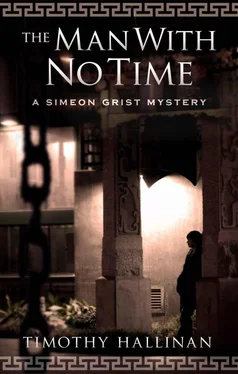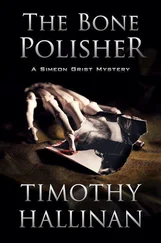Timothy Hallinan - The Man With No Time
Здесь есть возможность читать онлайн «Timothy Hallinan - The Man With No Time» весь текст электронной книги совершенно бесплатно (целиком полную версию без сокращений). В некоторых случаях можно слушать аудио, скачать через торрент в формате fb2 и присутствует краткое содержание. Жанр: Криминальный детектив, на английском языке. Описание произведения, (предисловие) а так же отзывы посетителей доступны на портале библиотеки ЛибКат.
- Название:The Man With No Time
- Автор:
- Жанр:
- Год:неизвестен
- ISBN:нет данных
- Рейтинг книги:3 / 5. Голосов: 1
-
Избранное:Добавить в избранное
- Отзывы:
-
Ваша оценка:
- 60
- 1
- 2
- 3
- 4
- 5
The Man With No Time: краткое содержание, описание и аннотация
Предлагаем к чтению аннотацию, описание, краткое содержание или предисловие (зависит от того, что написал сам автор книги «The Man With No Time»). Если вы не нашли необходимую информацию о книге — напишите в комментариях, мы постараемся отыскать её.
The Man With No Time — читать онлайн бесплатно полную книгу (весь текст) целиком
Ниже представлен текст книги, разбитый по страницам. Система сохранения места последней прочитанной страницы, позволяет с удобством читать онлайн бесплатно книгу «The Man With No Time», без необходимости каждый раз заново искать на чём Вы остановились. Поставьте закладку, и сможете в любой момент перейти на страницу, на которой закончили чтение.
Интервал:
Закладка:
“It's Eleanor Chan.” Eleanor pulled me forward. “And a friend.”
“Eleanor, dear,” Mrs. Summerson said, fumbling with the lock on the screen door. “What a treat to see you, not that I can really see you, I'm afraid. How are the children?”
“The children,” Eleanor said, momentarily thrown. She absolutely cannot tell a lie without preparation.
“Your little boy and girl,” Mrs. Summerson said, all blue eyes though the lenses. “Twins, aren't they?”
“The twins, yes,” Eleanor said, “well, no, they're not mine. They're my sister-in-law's.”
Mrs. Summerson peered at her for a moment as though she'd forgotten what she was going to say next, but then her face cleared. “Of course,” she said, “you're their aunt, aren't you? I vow, I'm losing my mind completely.” She waved a hand in front of her face, dispelling the fumes of confusion. “And look at me, keeping you standing here on the step like a pair of orphans. Please, come in, come in.”
She opened the door and then turned away from us and led us into the dim hallway, which smelled simultaneously of old sachet and cooking oil. As she retreated I heard her say, “Pansy is the mother, of course. Whatever is the matter with you?”
Mrs. Summerson was as tall as I was and had better posture. Her hair was white and cut bluntly, in a way that brought to mind the Chinese rice-bowl haircut. There was, in all, something indefinably Chinese about her in spite of her height and her big hands and fair skin and ice-blue eyes, something Asian in the way she held herself and in the way she walked, as though she were living in a climate much hotter than that of Southern California, and energy were something to be conserved. I could almost hear sandals slapping, and for a moment I remembered the old woman in my dream, the old woman with Lo's face.
“. . the parlor,” Mrs. Summerson was saying. “Right there, dear, to the right, you remember. Tea in a twinkling.” Eleanor and I went through a wide archway into the parlor, and Mrs. Summerson padded off toward the kitchen, saying to herself, “How nice this is.”
“She's gotten old,” Eleanor said wistfully, looking around the familiar room. We could have been in Canton. Chinese artwork was everywhere: fine old watercolors of clouds and mountains and bamboo and horses hung on the walls. Ivories and bronzes, smooth with touching, nestled close on shelves. The Three Ancients, ceramic and brightly colored, stood close together like gossiping old men, offering their blessings on the house. Above the fireplace hung a large black-and-white photograph of a plain wooden building set into a level, dusty field. The horizon was featureless. Lined up in identical uniforms in front of the building, which I had been told was a missionary school, were perhaps seventy Chinese children. They stared patiently into the camera, not hiding behind the photographic smile of the West. In the lower right-hand corner of the photograph, in white ink, was a date: January 10, 1942.
Next to the photograph was a framed embroidered sampler that said MY HANDS ARE FOR MY FELLOW MAN. MY HEART IS FOR GOD. Stitched below these lines were four lines of Chinese that, Eleanor had explained to me on the day of the twins' hundred-day party, meant the same thing. She'd spoken as an expert, since she'd done the embroidery when she was eight years old.
Eleanor had once lived in this house.
“I am a servant of the Lord,” Mrs. Summerson sang from the kitchen. “His wishes I attend.” Her voice was low and resonant, and it carried well. It had carried through churches and schools all over the face of China for almost twenty-five years.
Eleanor was staring at the sampler as though it were several miles away. Then she let her gaze wander over the room and down to the carpet. She listened to Mrs. Summerson sing, her eyes downcast, eight years old again and abandoned in Los Angeles.
“How long since you were here?” I asked.
“Same as you,” she said to the carpet. “Um, no. You've been here more recently.” She went to the sampler and straightened it. Then she untucked her shirt and ran it over the surfaces of some of the carved objects. She picked up a little ceramic statue of Christ, robed in incongruously bright Chinese gold and red, and blew on it. “She really can't see,” she said. “This place was never dusty.”
“No help?”
“Mrs. Summerson doesn't believe in help.”
“Well,” I said, “she's got the Lord.”
“You've got it backward.” She put the little Jesus down and went to the large photograph of the children and drew her sleeve across the glass. “Mrs. Summerson is the Lord's servant.”
“We're all the Lord's servants,” Mrs. Summerson said. “If only we knew it.” She pushed a jangling three-wheeler tea table into the room, lifting the back edge to roll it in front of her, and I hurried around to take it from her although she looked strong enough to carry it one-handed. She regarded me in a kindly fashion through the magnified eyes that made her glasses look like a dime-store joke. “So,” she said as I positioned the table in front of the small rosewood sofa, “this is your young man.”
“What a sweet thing for you to say,” Eleanor cooed. “Especially about an old codger like Simeon.”
“He looks young enough to me, dear,” Mrs. Summerson said, smoothing her big hands on the front of her skirt. “Young and vigorous. Lots of good hard work in him.”
“And that's where it'll stay,” Eleanor said. “Inside him.”
“The way you young people talk.” Mrs. Summerson bent forward and peered at the tea table to see whether she'd forgotten anything. “Jam, sugar, rolls, cream-do you take cream or milk, dear? — well, never mind, we have both, lemon, butter. The tea is Darjeeling. Please sit down. When I was married my husband and I never bantered back and forth like that. Of course, we were serious people. Too serious, I dare say. Still, it was a good life.” She sat at one end of the sofa, tucking her skirt under her legs. “You remember Dr. Summerson, don't you, Eleanor?”
“No,” Eleanor said, trying not to look surprised. “He was gone when I moved in.” She sat next to her.
“Honestly,” Mrs. Summerson said, waving her hand in front of her face again. “It's not enough I can't see what's in front of me, now half the time I can't remember what's behind me. It's like living by flashlight, and the little circle of light keeps getting smaller. Dr. Summerson passed on,” she said to me, “two years before Eleanor's mother-how is your mother, Eleanor? — took Horace up to Sacramento to open that what-was-it?”
“She's fine,” Eleanor said, smiling at her. “It was a grocery store.”
“Grocery store,” Mrs. Summerson said simultaneously, then tapped her temple. “Not completely gone yet. I told them it wouldn't work,” she said to me. “Sacramento had too many Chinese, I said, and the people up there couldn't tell them from the Japanese and there was still bad feeling about the Japanese in some places. Not as bad as in China, of course. If the Americans had suffered Japanese atrocities the way the Chinese did, I doubt there'd be a Jap left in America. We'd have run them into the sea.” She cleared the tension from her throat, a ladylike ahem. “They're your brother's twins, aren't they?”
“Yes, Mrs. Summerson,” Eleanor said, sounding like a little girl.
“Nice boy. More common sense than you have, but you've got the poetry.” She regarded the framed sampler. “Did you know, Mr. um. .”
“Grist,” I said.
“Did you know, Mr. Grist, that Eleanor tried to change that saying when she embroidered it in Chinese?”
Eleanor suddenly looked very uncomfortable.
Читать дальшеИнтервал:
Закладка:
Похожие книги на «The Man With No Time»
Представляем Вашему вниманию похожие книги на «The Man With No Time» списком для выбора. Мы отобрали схожую по названию и смыслу литературу в надежде предоставить читателям больше вариантов отыскать новые, интересные, ещё непрочитанные произведения.
Обсуждение, отзывы о книге «The Man With No Time» и просто собственные мнения читателей. Оставьте ваши комментарии, напишите, что Вы думаете о произведении, его смысле или главных героях. Укажите что конкретно понравилось, а что нет, и почему Вы так считаете.












